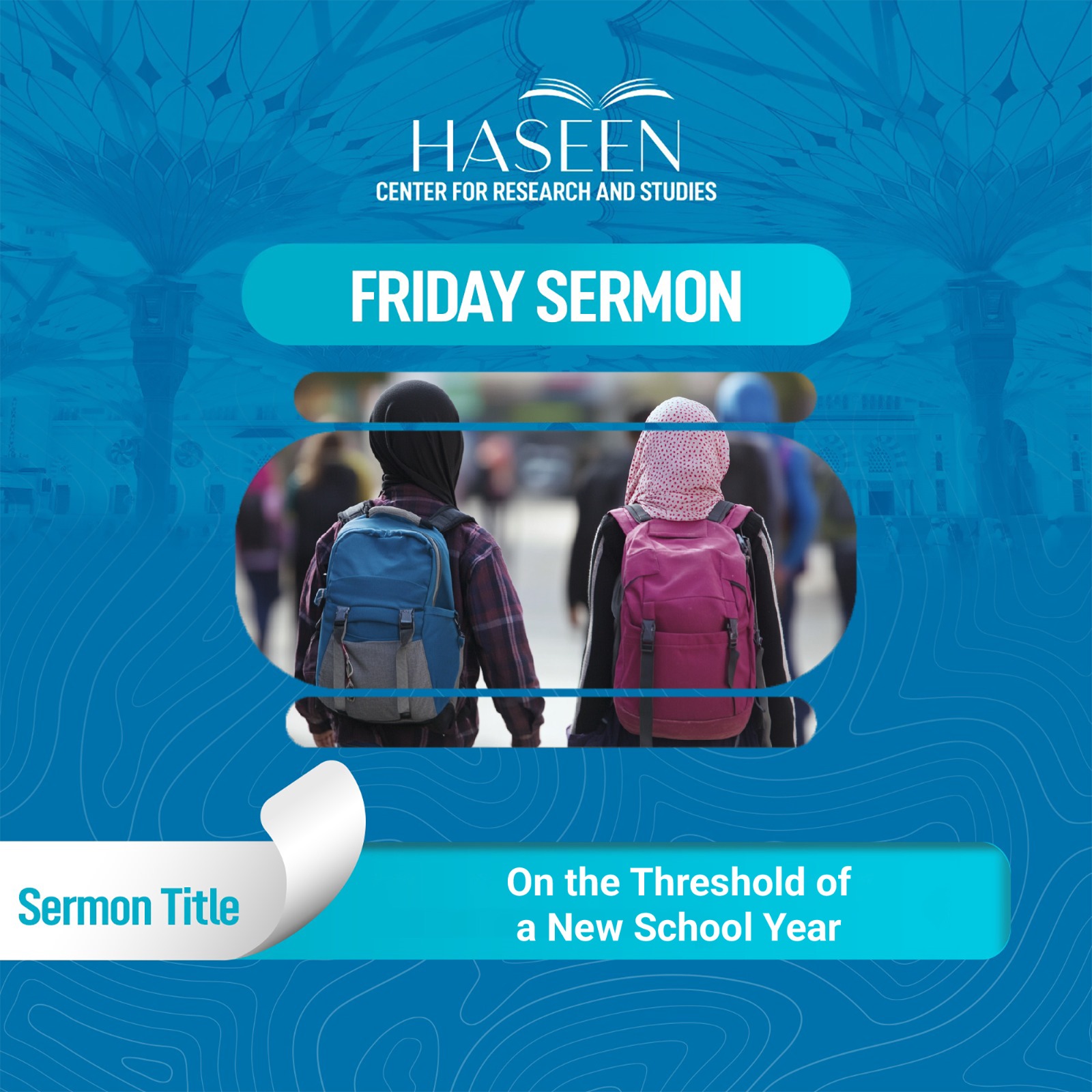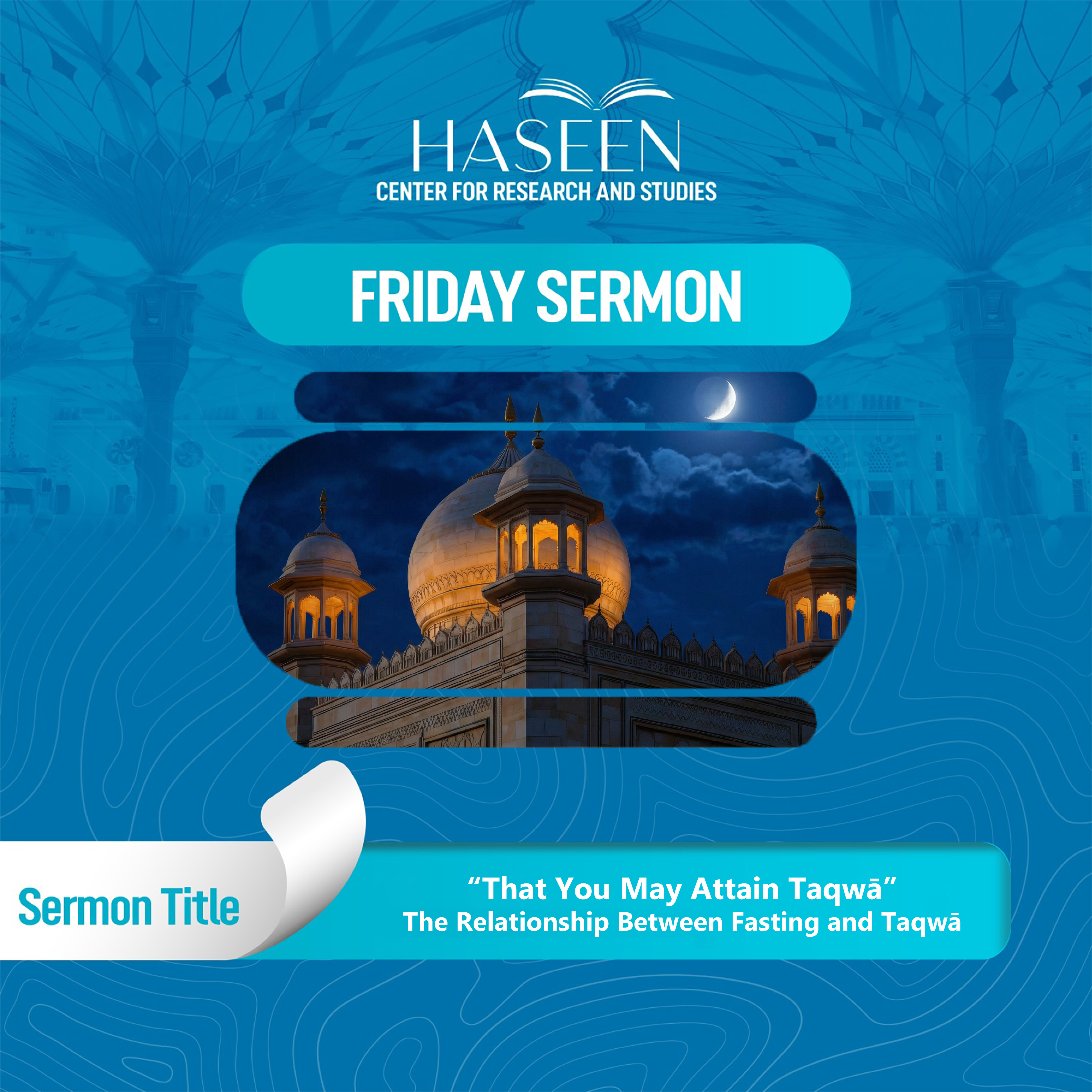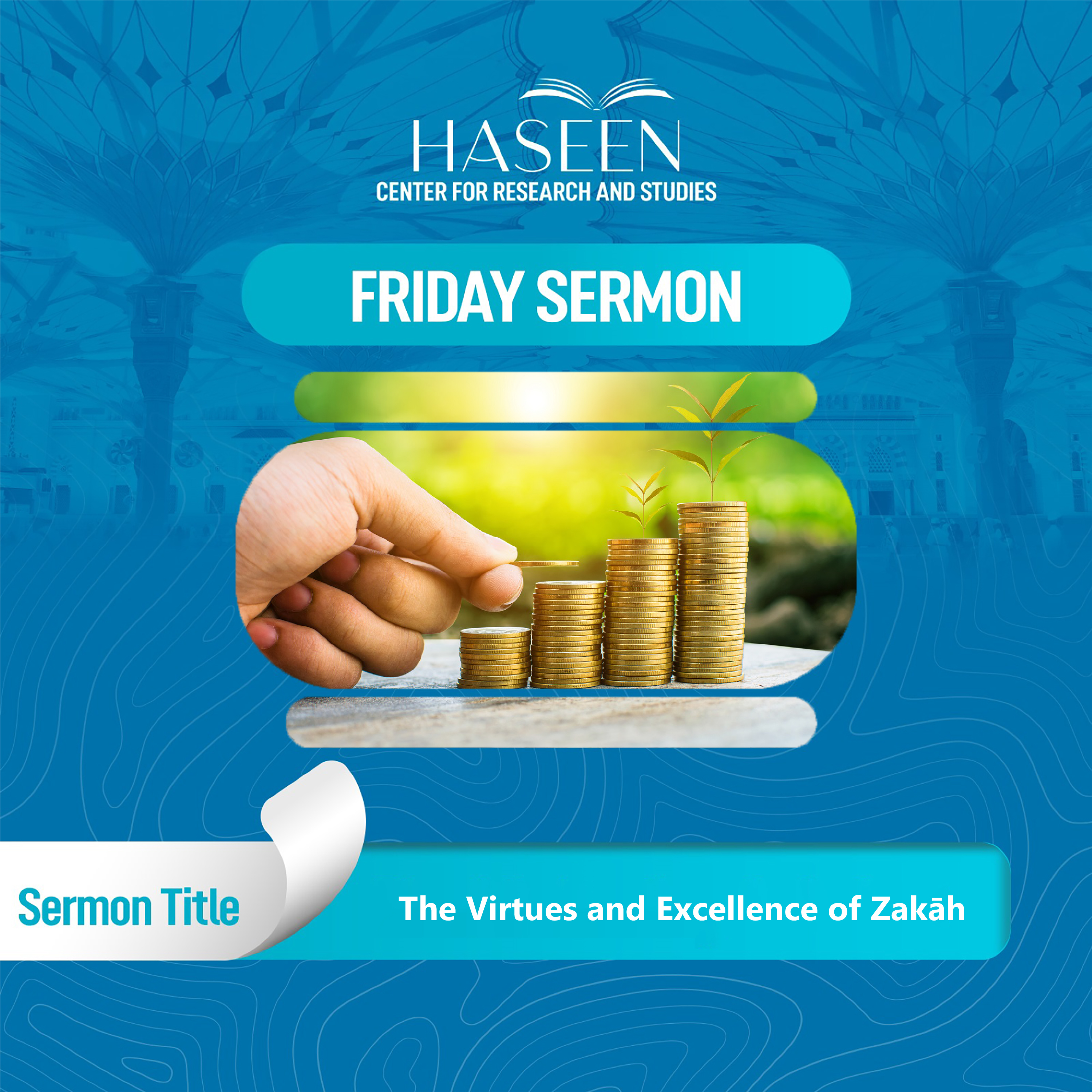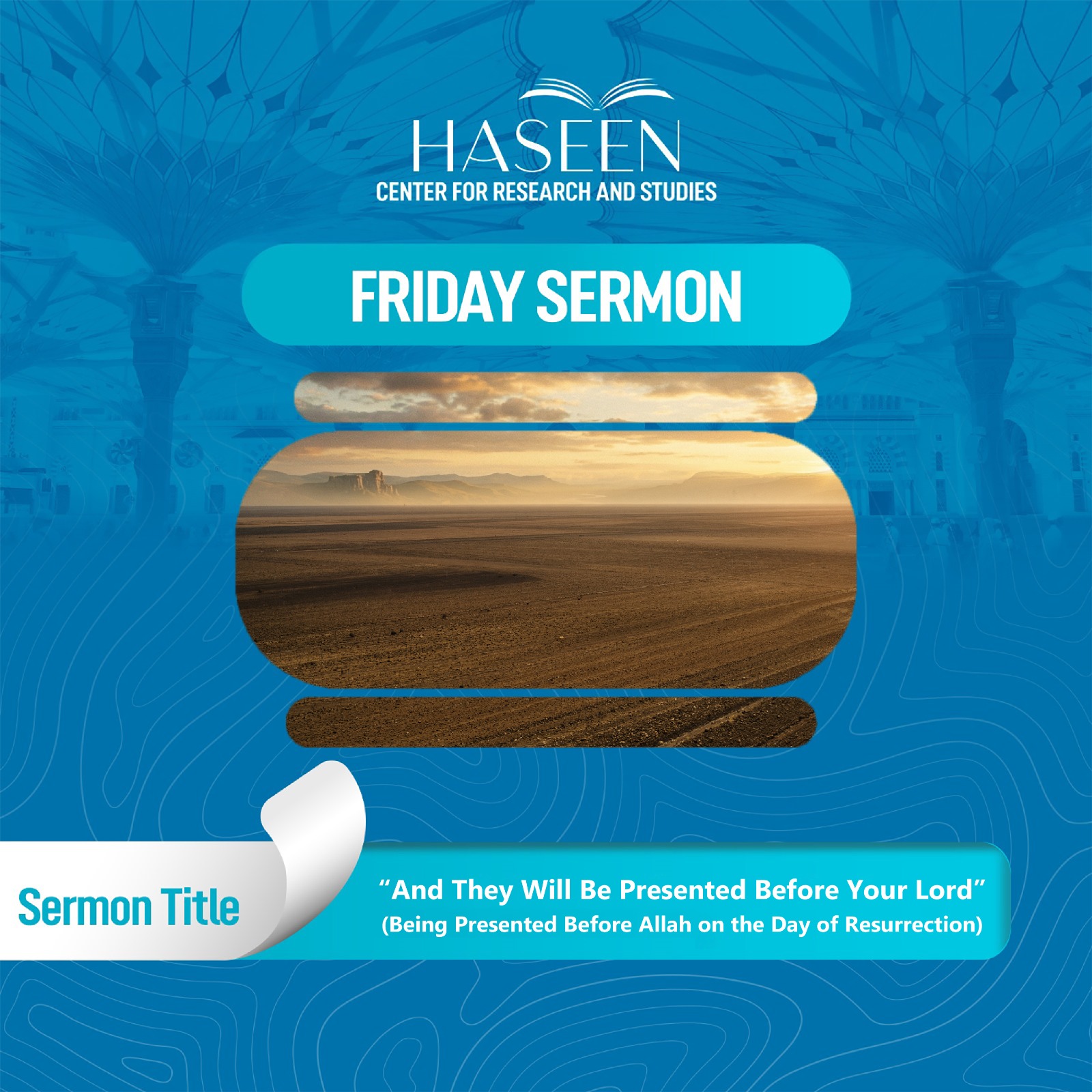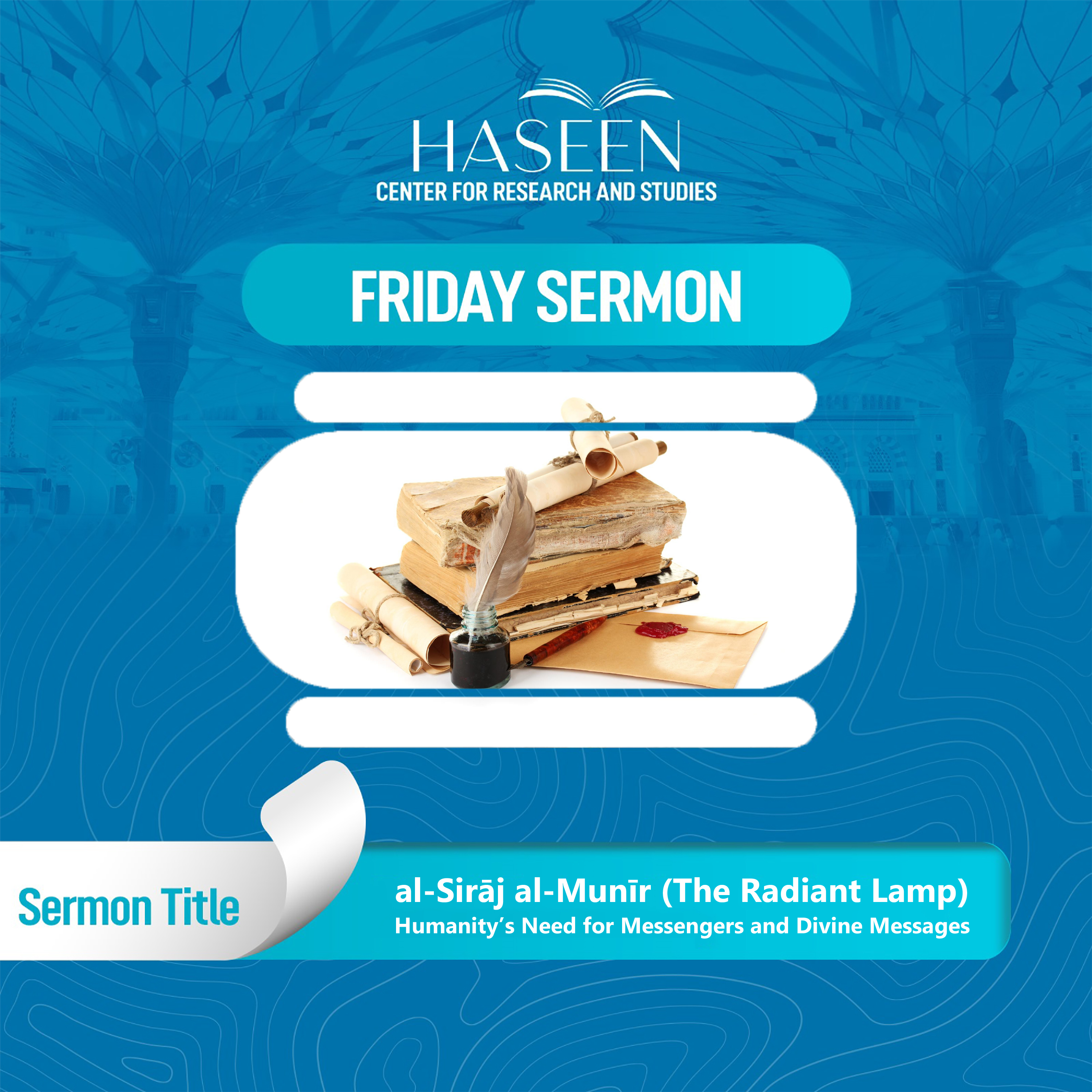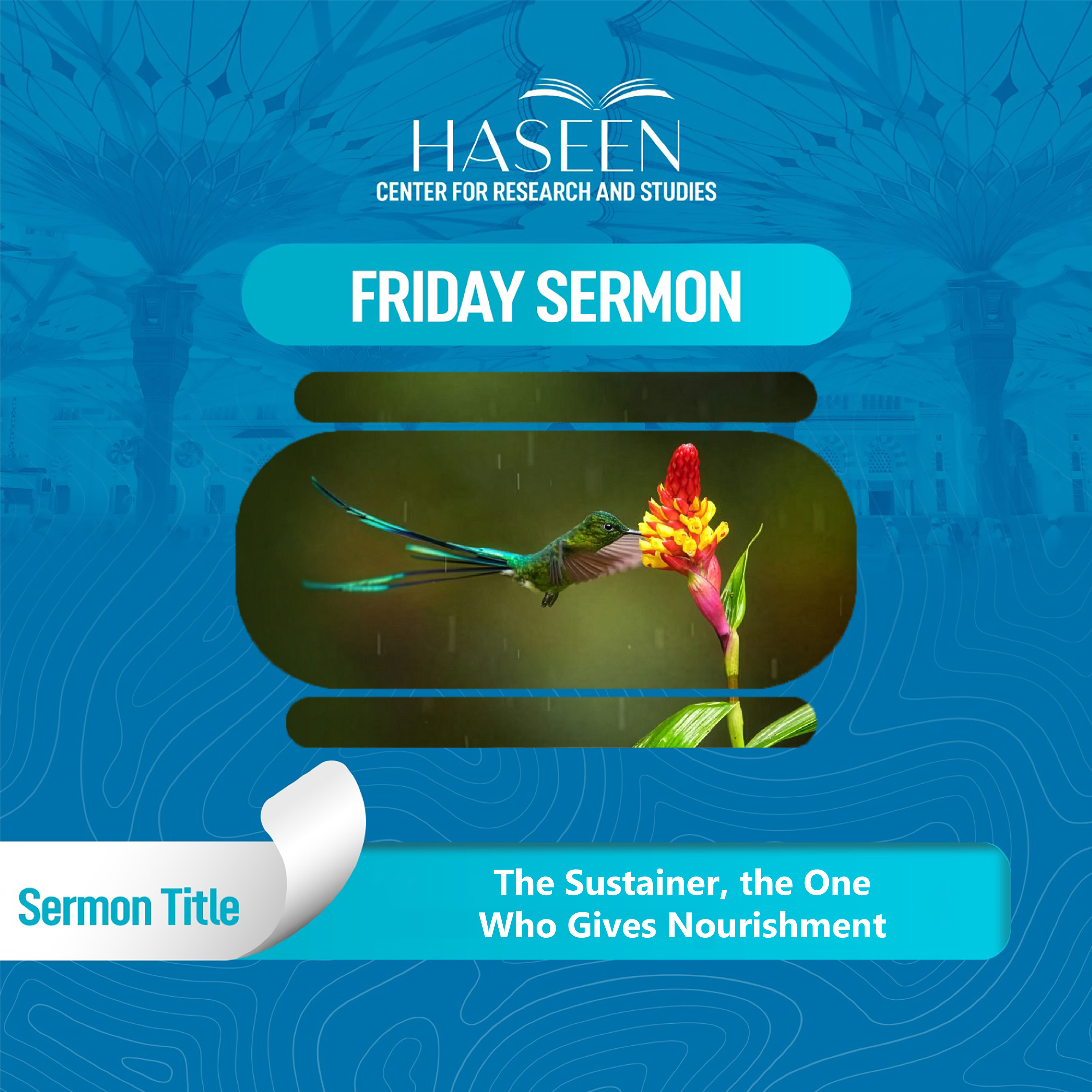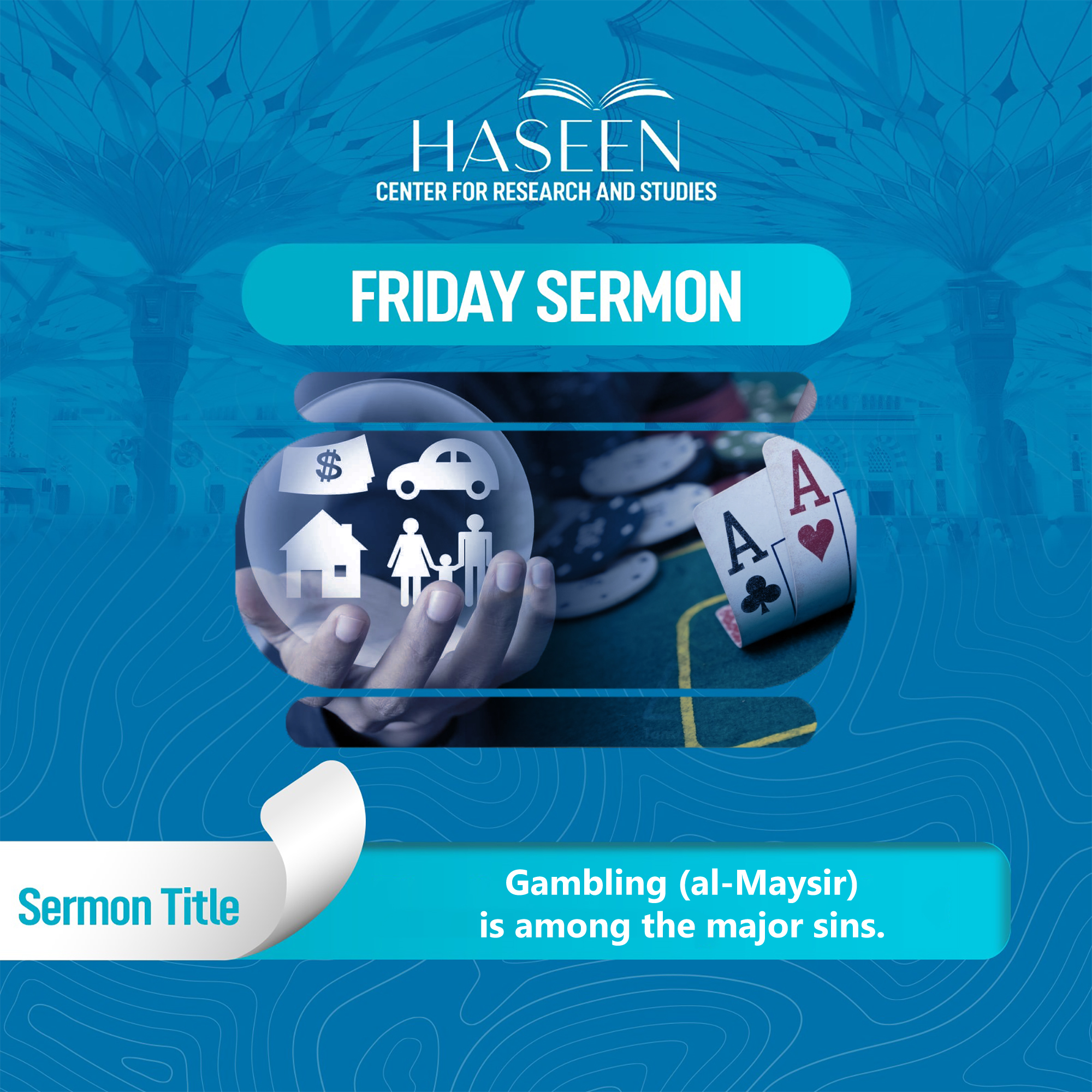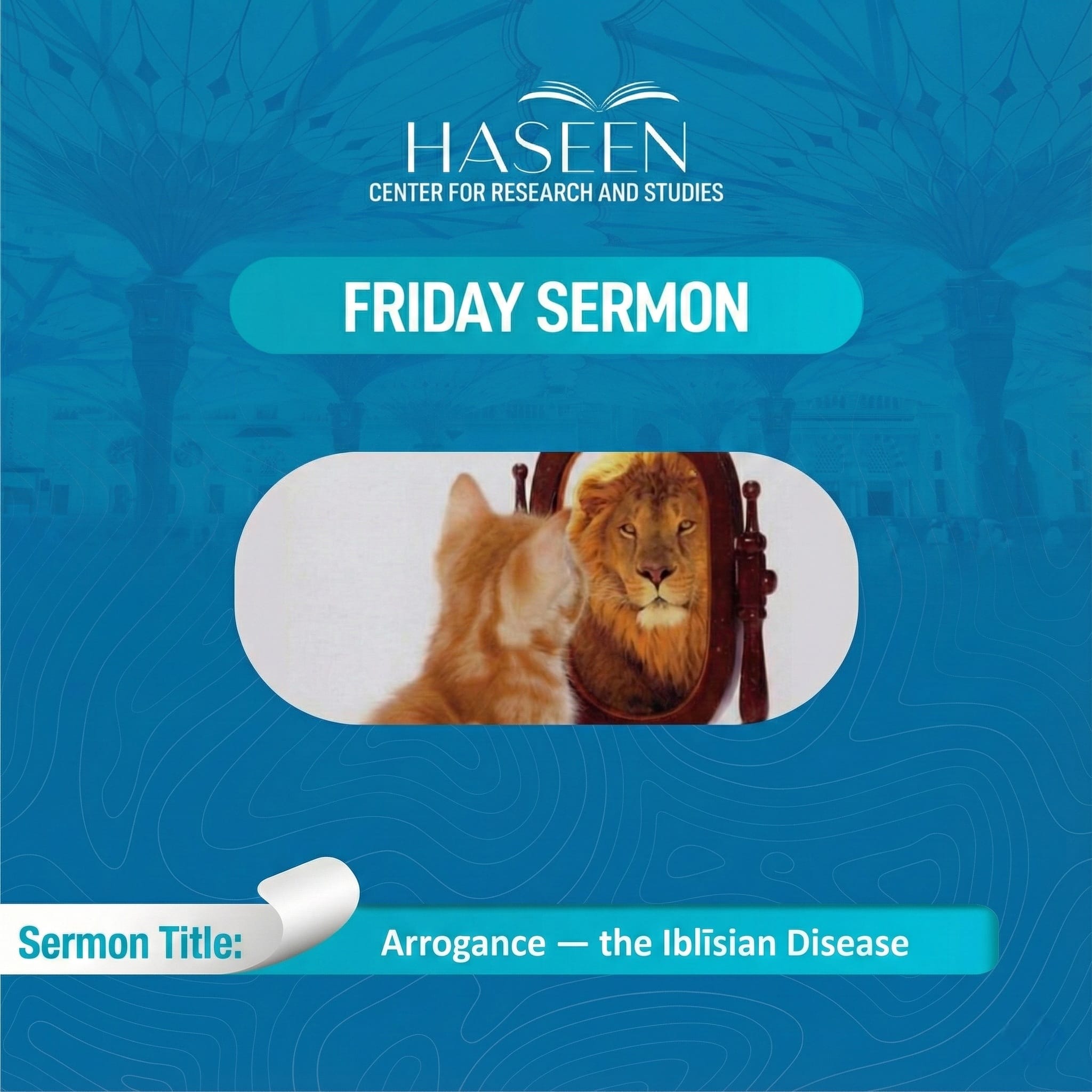Title of the Sermon: On the Threshold of a New School Year
Elements of the Sermon
1. Zaid bin Thabit, the young teacher and compiler of the Quran.
2. Advice for curriculum developers.
3. Advice for students.
4. Advice for teachers.
5. Advice for fathers and mothers.
All praise be to Allah, the All-Knowing, the Most Generous, who taught by the pen, taught humanity what they did not know. I bear witness that there is no deity worthy of worship except Allah alone, and I bear witness that Muhammad is His servant and messenger. May Allah exalt and send peace to him, his family, and companions in abundance.
To proceed:
Fear Allah, O servants of Allah, as He deserves to be feared, and be conscious of Him in both private and public:
يَا أَيُّهَا الَّذِينَ آمَنُوا اتَّقُوا اللَّهَ حَقَّ تُقَاتِهِ وَلَا تَمُوتُنَّ إِلَّا وَأَنْتُمْ مُسْلِمُونَ
“O you who believe, fear Allah as He should be feared and do not die except as Muslims” (Aul-‘Imran: 102).
Servants of Allah:
Have you heard of the first person to gather the glorious Quran into a book form in the history of Muslims? Our hero is Zayd ibn Thabit Al-Ansari, may Allah be pleased with him.
When the Prophet ﷺ migrated to Madinah, a young boy, Zayd ibn Thabit, who was eleven years old at the time, was brought before him. They said, "This is a boy from the tribe of Najjar; he has memorized a number of the surahs that Allah has revealed to you." The Prophet ﷺ was pleased with that and said:
"O Zayd, learn for me the writing of the Jews, for by Allah, I do not trust the Jews with my book."
Zayd said: "So I learned their script, and not even fifteen days passed before I mastered it. I would read their letters for him when they wrote to him, and I would write for him when he wrote to them." (Narrated by Abu Dawood).
In another narration, the Prophet ﷺ asked him:
"Do you know how to write in Syriac? It is possible that letters may come to me in that language." Zayd said: "No."
The Prophet ﷺ said:
"Then learn it."
Zayd said:
"I learned it in seventeen days." (Narrated by Ibn Hibban).
Zayd, full of zeal and determination, mastered the Jewish script and even learned the Syriac language in just half a month! Blessed are those with the will and insight.
Zayd continued his pursuit of knowledge until he became the compiler of the Quran, a scribe of revelation, an imam in jurisprudence, and a scholar of inheritance and judicial matters. After the death of the Prophet ﷺ, the companions unanimously decided to compile the Quran into a single book, and Abu Bakr As-Siddiq chose Zayd for this great task, saying:
"You are a young, intelligent man, and we have no suspicion about you. You used to write the revelation for the Messenger of Allah ﷺ. So seek out the Quran and compile it." (Narrated by Al-Bukhari).
Thus, Zayd diligently undertook this task under the supervision of the senior companions.
Servants of Allah:
Nations are built by the hands of their sons and the vigor of their youth. Through them, glory is crafted, the religion is safeguarded, and lands are preserved.
The first foundation that must be laid in building our children, after faith, is removing ignorance through education, for they are the leaders of the future and the beating heart of the Ummah.
This is what Urwah ibn Az-Zubayr used to say when he gathered his children:
"O my sons, learn! For if you are small among one people, you may be great among others." (Narrated by Ad-Darimi).
Brothers and sisters in Islam:
We are on the threshold of a new academic year. Our children will go to schools and universities, spending most of their time there, learning manners and beneficial knowledge. And since religion is sincere advice, advice must be given:
Firstly: To those responsible for crafting the curricula, which is the foundation of the educational process.
We say to them: There is knowledge that is beneficial, knowledge that has no benefit, and knowledge that is harmful and of no good.
The trust that Allah has placed on your shoulders requires you to ensure that the matter is given to the right people by selecting competent individuals who will develop the most complete, beneficial, and important curricula for both this world and the hereafter. You must avoid outdated or corrupt curricula and purify worldly sciences from anything that contradicts Islamic beliefs and law. Fulfill your trust, and teach our children what will preserve their religion, protect them from the trials of doubts and desires, and instill in them pride in Islam and adherence to the law of Allah and the Sunnah of His Prophet ﷺ.
Secondly: To our children, the beloved fruits of our hearts, who are steadfast on the frontlines of learning, building the legacy of our glorious Ummah.
O hope of the Ummah: The first knowledge that must be inscribed in your hearts and written in your minds is the knowledge of Allah and His religion. For what good is a person who does not know his Lord and his religion, even if he reaches the highest levels in worldly sciences? Allah says:
فَاعْلَمْ أَنَّهُ لَا إِلَهَ إِلَّا اللَّهُ
"So know, [O Muhammad], that there is no deity worthy of worship except Allah" (Muhammad: 19).
Then know, may Allah preserve you, that every beneficial knowledge needed by the Ummah, and whose ignorance would result in harm or difficulty for the Muslims, is a communal obligation to learn, and the reward for seeking it is immense in the sight of Allah.
Know, may Allah protect you, that a Muslim is distinguished from others by his intentions and goals. Therefore, do not make your aim in seeking knowledge the pursuit of worldly gains and its pleasures by any means, nor should your goal be status, fame, or power. Rather, let your intention be to remove ignorance from yourselves and to become strong, beneficial believers for yourselves and your Ummah, fulfilling the collective obligations that the Muslim community is responsible for. Only then will your steps toward knowledge be recorded in your scales of good deeds.
Also know that Allah will ask you about your youth, for it is the time of planting and nurturing. The Prophet ﷺ said: “The feet of the son of Adam will not move on the Day of Judgment from before his Lord until he is asked about five things: his life and how he spent it, his youth and how he used it, his wealth, how he earned it and how he spent it, and how he acted upon what he knew.” (Narrated by At-Tirmidhi).
Additionally, know that the greatest way to acquire knowledge is through piety toward the Lord of the worlds, who says:
إِنْ تَتَّقُوا اللَّهَ يَجْعَلْ لَكُمْ فُرْقَانًا
“If you fear Allah, He will grant you a criterion [to distinguish between right and wrong].” (Al-Anfal: 29).
With piety, the doors of knowledge open, and the intellect sharpens. May Allah have mercy on Ibn Al-Wardi, who said:
Fear Allah, for piety of Allah never resides
in a heart without connecting the person to success.
So, let your foremost concern be the righteousness of your religion, the preservation of your prayers, and to fear Allah wherever you are. If you guard Allah, He will guard you.
Also know, may Allah protect you, that our religion commands us to strive and exert effort and to grasp the Book with strength. The Prophet ﷺ said: “Allah is generous and loves generosity and noble character, and He dislikes vile character.” (Narrated by At-Tabarani).
The Prophet ﷺ also said: “Allah loves that when one of you performs a deed, he does it with perfection.” (Narrated by Abu Ya’la).
So, approach your studies with diligence and perseverance, and endure the pursuit of knowledge with determination and focus, for knowledge is not attained through comfort. Whoever remains attached to laziness misses out on leadership, and bliss is not attained through ease.
Know as well, may Allah protect you from evil, that a companion has influence, for the Prophet ﷺ said: “A person is upon the religion of his close friend, so let one of you look at whom he befriends.” (Narrated by Ahmad).
Therefore, choose for yourself a righteous, diligent, and hardworking companion, for spirits are like soldiers, and birds flock with their kind. How often has a sick person infected a healthy one?
Also know that showing respect to teachers is a sign of faith and good character. The Prophet ﷺ said: “He is not from my Ummah who does not respect our elders, have mercy on our young, and recognize the rights of our scholars.” (Narrated by Ahmad).
Mocking or ridiculing a teacher is a bad omen and a sign of ill manners, done only by the lowest of people.
Thirdly: To the guardians of our beloved children, the teachers, and the educators who are molding the most valuable wealth of the Ummah: the righteous human being.
You, who inscribe knowledge in the hearts of generations, stand on a great frontier, so beware that the Muslims are not attacked from your direction.
The trust of imparting knowledge and planting values is one of the heaviest responsibilities, and at the same time, it is among the greatest of good deeds.
Have you not heard the Prophet ﷺ say: “The most beloved of people to Allah are those who are most beneficial to others”? (Narrated by At-Tabarani).
So, exert your utmost in teaching the children of Muslims. Make things easy and do not make them difficult. Be gentle and do not be harsh, for that is how the best of teachers, our Prophet Muhammad ﷺ, acted. Muawiyah bin Al-Hakam said about him after he made a mistake: “I have never seen a better teacher before or after him. By Allah, he did not scold me, hit me, or insult me.” (Narrated by Muslim).
It is time for you to raise generations of capable and insightful individuals, who neither know corruption nor decline, and who are neither submissive nor broken. Seek Allah’s help and be patient for the future, for the seeds will soon grow strong and firm.
May Allah bless me and you in the great Quran and benefit us from its verses and wise reminders. I ask Allah for His forgiveness for myself and for you, so seek His forgiveness, for He is the All-Forgiving, Most Merciful.
The second sermon
All praise be to Allah, and may Allah exalt his messenger and send peace to him, his family, and his companions.
The final message is for you, dear fathers and mothers:
A righteous child is a blessing, and the measure of their righteousness and success is their faith and piety. Let this be the most important concern for you regarding their upbringing. Instill in them the meanings of faith, teach them their religion, and do not cut them off from the mosques and Quran circles, for faith and righteousness are the foundation of building character.
Also, know that the triad —the mosque, the home, and the beneficial educational institutions— when they work together, they produce righteous and reforming generations. Each has its role, supporting and complementing one another, rather than conflicting.
Instill this verse in your children's hearts:
وَأَعِدُّوا لَهُمْ مَا اسْتَطَعْتُمْ مِنْ قُوَّةٍ
“And prepare against them whatever you are able of power.” (Al-Anfal: 60)
Teach them that the Muslim relies on Allah but does not depend solely on that; they strive without faltering. Engrave in them the advice of the Messenger of Allah ﷺ:
"The strong believer is better and more beloved to Allah than the weak believer, but there is goodness in both. Be eager for what benefits you, seek Allah's help, and do not give up." (Narrated by Muslim).
O Allah, rectify for us our religion, which is the safeguard of our affairs, rectify for us our worldly matters in which we live, and rectify for us our Hereafter to which we will return.
O Allah, grant victory to Islam and honor the Muslims, and destroy the Jewish criminals.
O Allah, send tranquility into the hearts of those striving in Your cause, protect Your weak servants, and raise the banner of Your religion, by Your strength, O Mighty and Strong One.
O Allah, guide our leaders to what You love and are pleased with, and take them by the forelock toward righteousness and piety.
Our Lord, grant us good in this world and good in the Hereafter, and protect us from the torment of the Fire.


